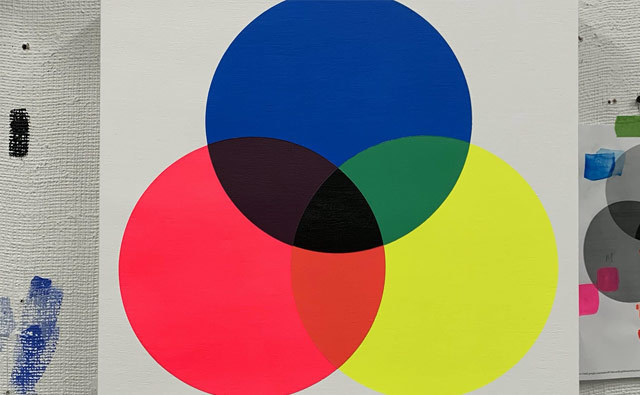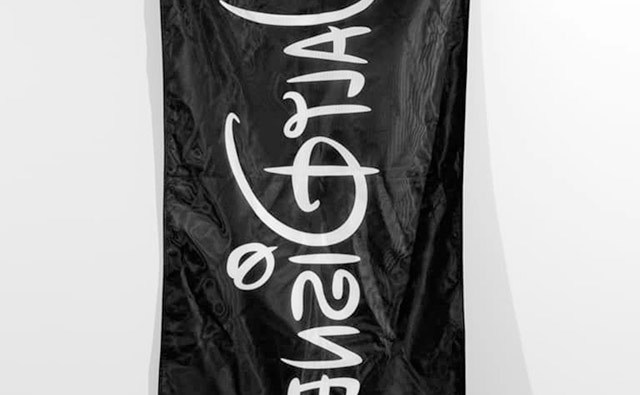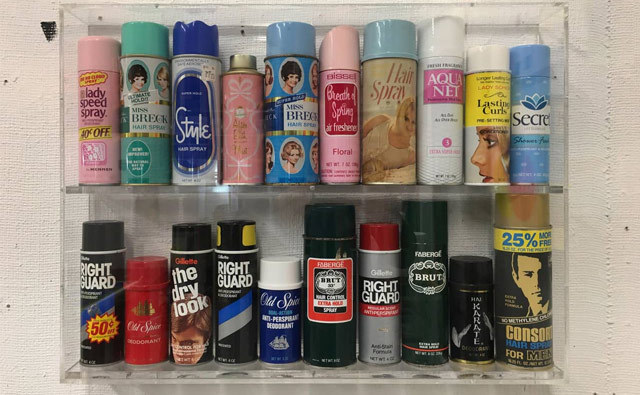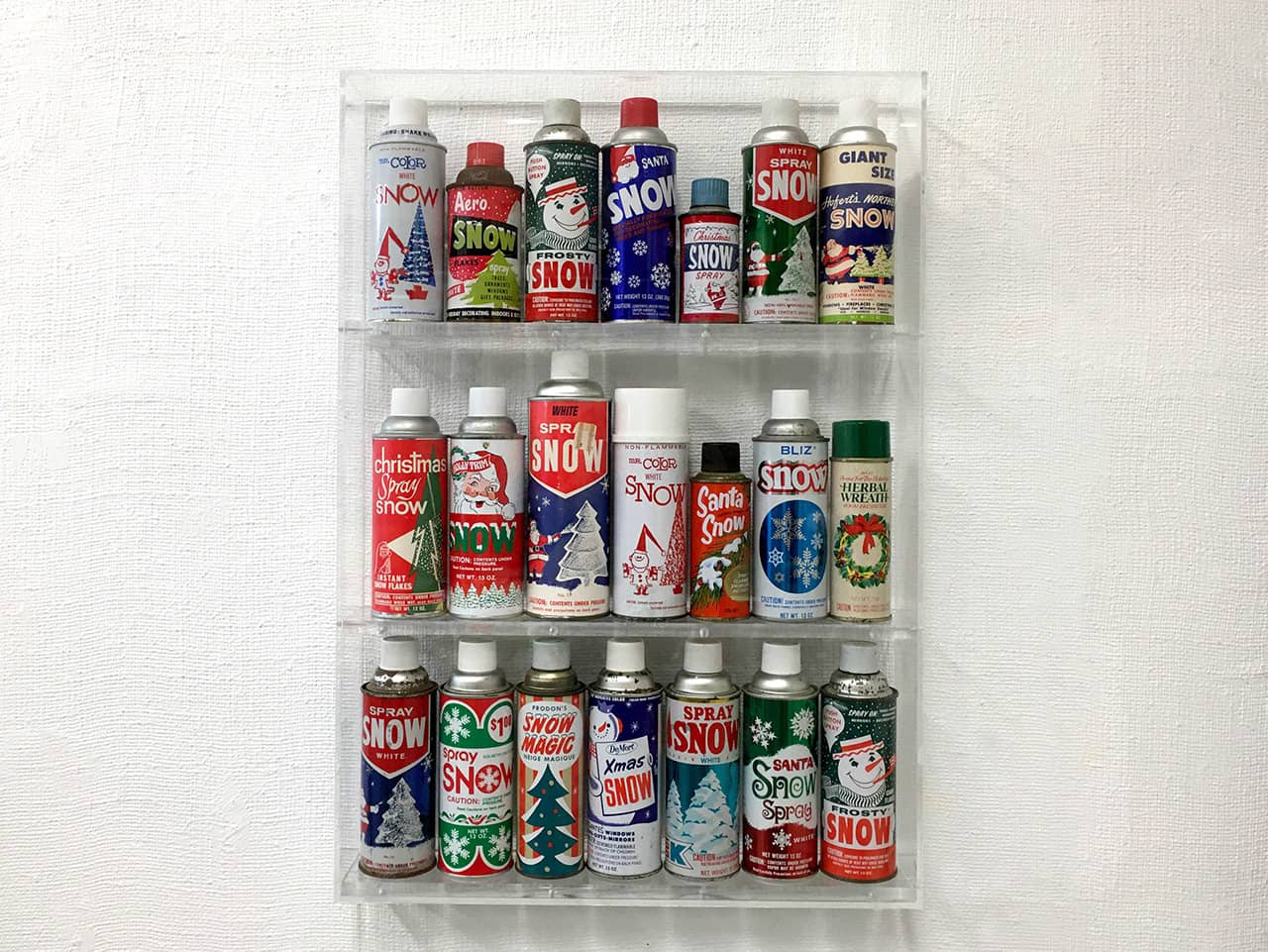
Global Warning (2018)
Douglas Coupland
Vintage aerosol spray cans; plexiglass
A potent childhood smell memory for me, and probably many others, is the smell of spray snow from aerosol cans. It scares me to imagine what chemicals were actually in those cans but their contents, bonded onto pine boughs, is for me the aroma of heaven. It feels strange to look at these cans now, embalmed inside a plexiglass crypt, their contents gone or expired. In five hundred years what will people make of such an accumulation? Perhaps people will see it as an ecological version of King Tut’s tomb. As a whole, this piece seems to generate several mixed messages and plus a whiff of dread. It’s an unholy alliance of the ozone-eating, spray can compressant Freon[1] with the Star of Bethlehem. It’s the hubris of push-button weather, and pagan notions of omniscience and climate control. It’s like watching old movies in which everybody is smoking cigarettes and suddenly all you can think of is, “People really smoked like that back then?” In the case of this piece it’s, “People really thought thick chemical fogs doused overtop trees harvested brutally young was a way of celebrating a potential rebirth of the soul?” Tempus fugit.
I’ve just spent a bit of time staring at Global Warming (it hangs in the front hallway of my house) and I’ve been analyzing my takeaway. I’m realizing that snow-in-a-can is not a phenomenon that arose on its own. It mirrored, and grew alongside, the American westward expansion that began in the 1930s with the introduction of another Freon nightmare: air-conditioning. Air conditioning allowed states like California, Arizona, Texas, and Florida to grow from sleepy backwaters to economic powerhouses. It allowed for hyper-urbanization in Japan, China, South America, and most of the equatorial world. A political map of world without Freon would be a very different map indeed. A Pasadena family homesick for Michigan and putting up a Christmas tree in 1956 would probably not make the connection between upward mobility, westward expansion, developments in long-chain monomer chemistry, and global environmental degradation. But in 2020 we can.
There is a scene towards the end of the film All About Eve (1950; 20th Century Fox) in which three characters are in a car that runs out of gas one evening on a semi-rural Connecticut road. Outside the car is a Christmas winter wonderland. A young Martha Stewart was probably growing up somewhere nearby. What amazes me about this scene is the assumption of guaranteed weather simply because it’s a certain time of year—it’s winter, hence it will be cold, and there will be snow! Only an idiot would assume that now.
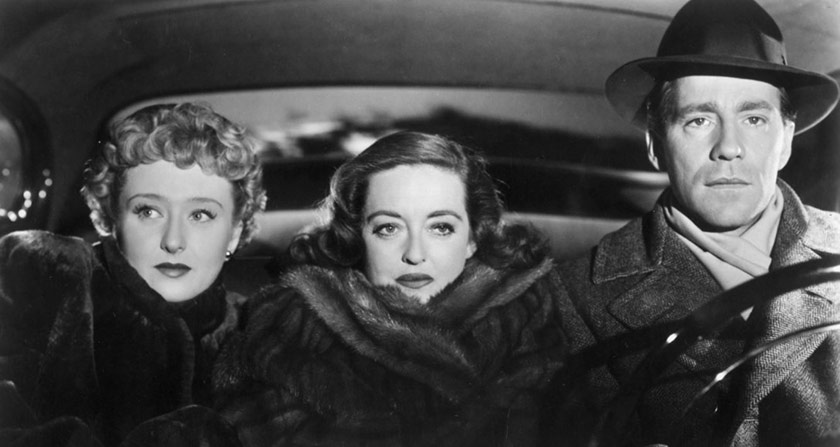
I live directly below Cypress Mountain in West Vancouver. During the 2010 Olympics there was only a feeble snowfall that year, and dump truck-loads of snow had to be hauled in from mountains far away. In the newspaper they said that every truckload was $1,000, and I remember hearing them relentlessly driving up the mountain all night, their engines droning, a million dollars-worth of emergency snow being used to bolster the straw covered flanks of a snowboarding course. The sound of those trucks haunts me. It haunts Global Warming. The piece is a time capsule of an era that can never return, of a way of looking at the world that was at once magical and ultimately foolish and yet we long to be back there, long to not know the things that we know now.
[1] Thomas Midgley, Jr. created the first non-flammable, non-toxic chlorofluorocarbon gas, Freon (R-12), in 1928. The name is a trademark name owned by DuPont for any chlorofluorocarbon (CFC), hydrochlorofluorocarbon (HCFC), or hydrofluorocarbon (HFC) refrigerant. The refrigerant names include a number indicating the molecular composition (e.g., R-11, R-12, R-22, R-134A). The blend most used in direct-expansion home and building comfort cooling is an HCFC known as chlorodifluoromethane (R-22). Though banned under the Montreal Protocol, bootleg Freon production continues to this day.

